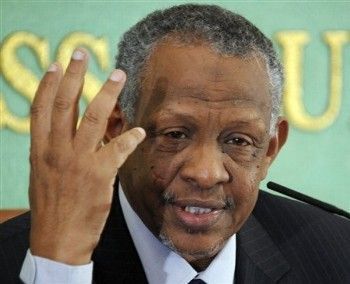NCP official admits likelihood of South Sudan’s secession, downplays its economic impact
December 16, 2010 (KHARTOUM) – A senior member of the ruling National Congress Party (NCP) has conceded that the secession of South Sudan in the upcoming referendum vote is “probable”.

The referendum is a key plank of the Comprehensive Peace Agreement (CPA) which was signed in 2005 by the NCP and the former southern rebels Sudan People’s Liberation Movement (SPLM) to end ended decades of north-south civil war.
Most observers say that southerners, who feel aggrieved by years of civil war and perceived exploitation of successive governments in the north, are likely to choose secession.
The NCP’s deputy chairman Nafi Ali Nafi, whose party has been ostensibly campaigning for unity, admitted on Thursday that the south is bound to secede.
According to Sudan’s official news agency SUNA, Nafi told a gathering of party supporters that all ongoing efforts to retain Sudan’s unity had failed, explaining that the secession of the south is probable because it represents the SPLM’s direction which is supported by the entire Western world.
“No matter what we do we will reach this conclusion which will be recognized by the entire world… we must not deceive ourselves or cling to wishful thinking, we must resign to facts and realities,” Nafi said.
However, the hard-line NCP official has sought to assuage fears of a possible economic downturn in the oil-dependent north due to the possible secession of the south.
Sudan derives nearly 80 percent of its proven daily output of 500,000 oil barrels a day from oilfields in the south, but the pipeline that carries the oil to export terminals and refineries runs through the north. The two former foes need each other’s cooperation to sustain their oil-dependent economies.
Nafi said that those who spread rumors that the economy in the north would collapse due to the south’s secession were “greatly deluded,” adding that the secession would have “no impact” on the economy of the north which has “many alternatives in agriculture and minerals.”
Meanwhile, President Omer Hassan Al-Bashir has said that the north would only recognize the referendum outcome if it genuinely reflected the will of southern Sudanese.
Al-Bashir made these remarks during a meeting held on Thursday in Khartoum with a delegation of the African Union Peace and Security Council (AUPSC).
According to the state minister for foreign affairs, Kamal Hassan Ali, President Al-Bashir assured the AUPSC delegation that the government in the north would cooperate with southern officials to sustain stability and shore up social and economic ties if the south decided to secede.
The Constitutional Court asked today the Southern Sudan Referendum Commission to respond to the six legal petitions against the process presented by a group of lawyers seeking a ruling on alleged violations related to the voter registration in preparation for the South Sudan vote on independence next month.
(ST)
